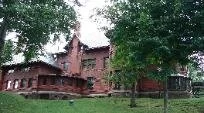|
Samuel Clemens House Back to Transcendentalism
|
|
|
|
 |
|
|
The house of Samuel Clemens (pen name Mark Twain) was built
in a new, upper class development in Hartford, Connecticut by
Sam for his wife Olivia and family. The large house was close to
his publisher downtown, and Sam looked forward to moving into
the house which would have ornate decoration added to the
interior by artisans of Tiffany.
|
|
|
|
|
|
|
The monies used to build the home were his well to do wife’s, and it remained in her Olivia's name.
This would become important later in life, as Sam’s investment failures eventually found him
bankrupt despite his worldwide fame and published works which yielded him much money. In fact,
most of his famous writings were penned in the third floor billiard room which also served as his
study and place of entertaining his male friends. Often Sam and his buddies enjoyed drink and
cigars in the upstairs of the beautiful mansion.
|
|
|
|
|
|
|
|
Samuel Clemen’s life with his three young daughters and wife
in their Victorian house, were the best of times. Sam would
make up stories for his girls, by looking at objects on his
mantle. If but one of the objects were missing in his story, or if
he had them out of order, he would have to begin again. This
was good practice in story telling for both Sam and his
daughters. They also played many games together, such as
safari in the conservatory and a dinner game, whereby his
daughters could try and catch Sam making etiquette mistakes
and correct him by telling their mother.
Though Sam was not a transcendentalist, he was one of our
greatest minds of the time, and staunch supporter for the
abolition of slavery and equal rights. It should be of no
|
|
|
|
|
|
surprise then that Samuel Clemens would make visits across the lawn from time to time to visit his
famous neighbor Harriet Beecher Stowe, author of Uncle Tom’s Cabin. Though the house of
Samuel Clemens was Victorian, it definitely differed from other Victorian houses of the day. This led
some to ridicule it at first, but later the town of Hartford fell in love with the house as well as Samuel
Clemens, as his fame grew. Sam was very content to settle down and finally leave his wandering,
bachelor ways behind him.
|
|
|
|
|
|
|
|
Being a great mind and constant thinker, Samuel Clemens was also interested
in investing in new ideas and technology. When a bad investment in a
typesetting machine bankrupted Sam, he and his family moved to Europe due
to the cost of living being much cheaper. They maintained ownership of the
house in Hartford, however. For many years, Samuel Clemens and his family
found themselves moving from place to place all over Europe, until he agreed
to do a one year lecture tour, despite his poor health. The lecture circuit
yielded Sam enough monies to not only pay off his debts, but give him his
wealth back. This eventually led to his daughter Susy being the first to make
her way back to their beloved home in Hartford, where she and her sisters had
so many good memories of playing with their dad and listening to his tales.
Susy, when she returned to the home, contracted meningitis and died in it.
This major tragedy broke the Clemens’ family’s hearts, and Sam mentioned
how fitting it was that she passed away in the house they all loved, having
made it back home before the rest of them. After her passing, the
|
|
|
|
|
|
the family felt they couldn’t return and live in the home, and decided to move away from the
neighborhood and house which they had so loved. All but one of Sam's children (Clara) and his
wife would precede him in death.
Is the house haunted today? It could be. There have since been a boy’s school and library to
occupy the home. Many a memory and history has been recorded in this home built in the mid-
1800s.
Watch a short video of the Samuel Clemens House below:
|
|
|
|
|
|
|
|
Website Content Copyright 2004-7 Angels & Ghosts, LLC AngelsGhosts.Com
|
|
|
|
|
